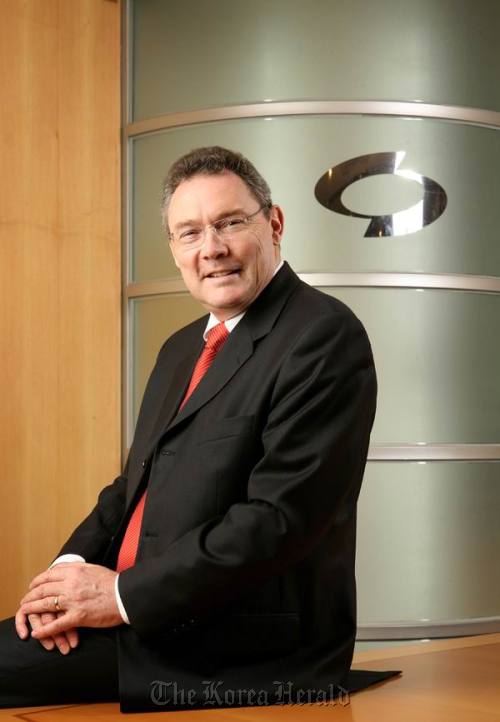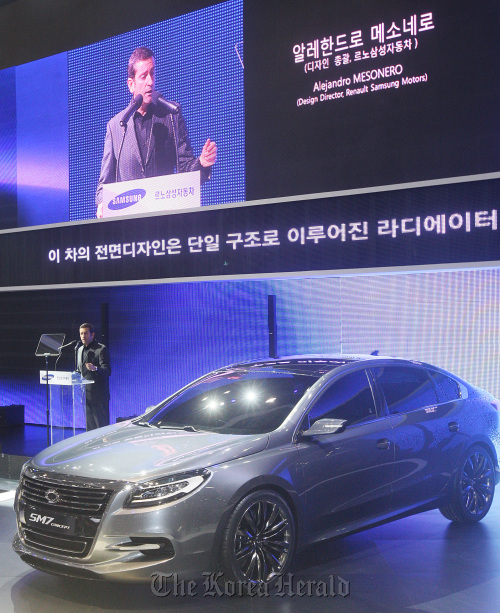CEO says carmaker will boost cooperation with Samsung Group
Now in its 11th year, Renault Samsung Motors Co. has grown rapidly to become a major automobile exporter with the aid of its parent Renault S.A. of France.
While the company has expanded its presence at an unprecedented rate, with exports growing 600-fold from 2000 to 2010, Renault Samsung is now eyeing bigger things in the future.
In an interview on the sidelines of the press preview of the Seoul Motor Show on March 31, the company’s chief executive Jean-Marie Hurtiger provided a glimpse into plans in the offing at the company.
The plans include entering a segment new for the company and expanding cooperation with Samsung Group. The nation’s top business group’s now defunct Samsung Motors provided the foundations for Renault Samsung Motors.
Along with such plans, the company also unveiled the show car version of the updated SM7 large sedan. The current SM7 was launched in late 2008.
Now in its 11th year, Renault Samsung Motors Co. has grown rapidly to become a major automobile exporter with the aid of its parent Renault S.A. of France.
While the company has expanded its presence at an unprecedented rate, with exports growing 600-fold from 2000 to 2010, Renault Samsung is now eyeing bigger things in the future.
In an interview on the sidelines of the press preview of the Seoul Motor Show on March 31, the company’s chief executive Jean-Marie Hurtiger provided a glimpse into plans in the offing at the company.
The plans include entering a segment new for the company and expanding cooperation with Samsung Group. The nation’s top business group’s now defunct Samsung Motors provided the foundations for Renault Samsung Motors.
Along with such plans, the company also unveiled the show car version of the updated SM7 large sedan. The current SM7 was launched in late 2008.


The following is the text of the interview:
Korea Herald: Could you elaborate on your comment that Renault Samsung will expand cooperation with Samsung Group?
Jean-Marie Hurtiger: We are proud to be an affiliate of the Samsung Group, and we have kept the ties. In discussions with Samsung Group, we realized that they were interested in the car business and were considering that there was potential for growth in the car area.
We thought it was interesting because we could work with them on developing new products and also benefit from their capacity of bringing innovations in the market.
So, we have many exchanges and are in the process of, identifying what we will do together.
These are high level meetings and it is progressing quite well, but all I can say for now is that you will see very soon in our cars examples of the cooperation between Samsung companies and us.
KH: You said that Samsung Group is interested in the car business. Does that mean Samsung Group is looking to go into the car business again?
JMH: No, as they are already in the car business with Renault Samsung.
They are talking about using their technological expertise and the know-how to develop a business model.
Actually I had a full presentation by Samsung Group of all the areas of the car industry they are working in, like multimedia, LED and materials, and it is pretty wide.
But it (the collaboration) is in the more technological field. We are not talking about making cars.
KH: Will Samsung Group’s part in this collaboration be mainly in the field of electronics?
JMH: It would be electronics, but possibly in other areas. But of course electronics will be a big part.
They are working on advanced materials, chemical compounds for instance. They are working on new materials to get more interesting shapes, better design and lighter materials to reduce the weight of the car. There are many opportunities.
KH: Is this collaboration limited to between Renault Samsung and Samsung Group, or with there be a more general collaboration with Renault? Are the discussions still in the early stages?
JMH: Considering the size of Samsung, what we do with them is shared with Renault, of course.
I don’t know (about collaboration between Renault and Samsung Group) I don’t want to elaborate on that because it depends on Renault’s decision.
(The discussions have progressed) more than the early stages. We already have had some collaboration in some items.
KH: Could you give us a general timeline for the results of the collaboration becoming visible?
JMH: It can be very soon. Within this year, I think. And the more extensive (ones) will take several years. It’s an ongoing collaboration.
KH: You also mentioned small cars, and do you mean vehicles smaller than the SM3?
JMH: We are talking about the mini segment. We have been doing studies and we are proceeding into the development phase. It usually takes 3 to 4 years to get a car onto the market. The project is now in the active phase, it is not just speculation any more.
KH: The Korean market for mini cars (city cars) is growing but still remains relatively small compared to the compact and midsized segments, and the competition is quite fierce. Do you think that Renault Samsung may be entering the market too late?
JMH: We do not think so. When you look at the Korean market today, minis have been growing quite a lot. It is the third largest segment. If you look at small, small is a segment that is growing, and it is very crowded.
We have the CO2 pressure, fuel efficiency and so on. In our forecasts we see the segment continue growing over the next few years. So there is room for new entrants.
It is not too late. If you look at the Japanese market for instance, historically you have seen the mini (segment) growing very strongly for many years, so I think we will see the same thing happening in Korea.
KH: Could you provide a date for the launch of the new SM7?
JMH: We said second half. So, as soon as possible at the beginning of the second half.
When you launch a car, there are many issues; is the car ready, we need the quality, we need the volume. So you know, there will be some final adjustments, but really in August or September
KH: Will the new SM7 be exported?
JMH: We hope so, but definitely not for Europe as it is a car that is too big for European customers. But there are many countries where that kind of car is welcome. And the first one we think of is China, which is next door. And the Chinese like big cars. Second we can think of many Asia-Pacific nations like Australia, and then you can go to Gulf countries.
We are still working with marketing to define clearly what our targets are. There is clearly a lot of potential for export of this car.
KH: You have cut Busan plant’s production by 20 percent for April. How long do you expect the measure to be in place?
JMH: It is very difficult to make a definite forecast, because things are moving every day. We knew March would be difficult, and we had some capacity constraints in March, and we knew that April would be difficult. Today, our forecast is that things will get better by May and definitely in June. But it is still conditional in the sense that this is what we see, but there is no confirmation. Basically we see that things will normalize within two months.
By Choi He-suk (cheesuk@heraldcorp.com)







![[KH Explains] How should Korea adjust its trade defenses against Chinese EVs?](http://res.heraldm.com/phpwas/restmb_idxmake.php?idx=644&simg=/content/image/2024/04/15/20240415050562_0.jpg&u=20240415144419)











![[Today’s K-pop] Stray Kids to return soon: report](http://res.heraldm.com/phpwas/restmb_idxmake.php?idx=642&simg=/content/image/2024/04/16/20240416050713_0.jpg&u=)